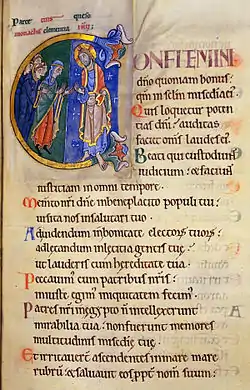Psalm 106
Psalm 106 is the 106th psalm of the biblical Book of Psalms. In the Greek Septuagint version of the bible, and in its Latin translation in the Vulgate, this psalm is Psalm 105 in a slightly different numbering system.
| Psalm 106 | |
|---|---|
 Illuminated manuscript of Psalm 106:1-8 in the St. Albans Psalter. The first word of the Psalm in the Vulgate is "Confitemini." | |
| Book | Book of Psalms |
| Hebrew Bible part | Ketuvim |
| Order in the Hebrew part | 1 |
| Category | Sifrei Emet |
| Christian Bible part | Old Testament |
| Order in the Christian part | 19 |
Text
- The original text is written in Hebrew language.
- This psalm is divided into 48 verses.
Uses
Judaism
- This psalm is recited on the second day of Passover in some traditions.[1]
- Verse 2 is the final verse of Anim Zemirot.[2] It is recited by some Jews following Psalm 126 before Birkat Hamazon.[3]
- Verse 45 is found in the Mussaf Amidah on Rosh Hashanah.[4]
- Verse 47 is the third verse of the long Tachanun recited on Mondays and Thursdays,[5] and is part of Baruch Hashem L'Olam during Maariv.[6]
References
- The Artscroll Tehillim page 329
- The Complete Artscroll Siddur page 487
- The Complete Artscroll Siddur page 183
- The Complete Artscroll Machzor for Rosh Hashanah page 461
- The Complete Artscroll Siddur page 125
- The Complete Artscroll Siddur page 265
- Kirkpatrick, A. F. (1901). The Book of Psalms: with Introduction and Notes. The Cambridge Bible for Schools and Colleges. Book IV and V: Psalms XC-CL. Cambridge: At the University Press. p. 839. Retrieved February 28, 2019.
External links
| Wikimedia Commons has media related to Psalm 106. |
- Psalm 106 in Hebrew and English - Mechon-mamre
- Psalm 106 King James Bible - Wikisource
- Gili Kugler, The Dual Role of Historiography in Psalm 106
This article is issued from Wikipedia. The text is licensed under Creative Commons - Attribution - Sharealike. Additional terms may apply for the media files.